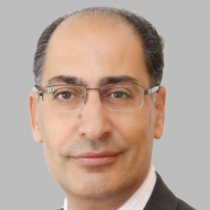This week's briefing on recent news and upcoming events in the region including Imran Khan's visit to the White House, tensions between President Trump and Congress over Turkey's new S-400 system, escalation in the Straits of Gibraltar and Hormuz, military restructuring in Iraq, increased collaboration on the region's power supply, and changes to Egypt's social safety net, featuring Arif Rafiq, Gonul Tol, Ruba Husari, Robert S. Ford, Dr. Ibrahim Saif, and Mirette F. Mabrouk.
Pakistani PM Khan heads to the White House
Arif Rafiq
MEI Scholar

President Donald Trump hosts Pakistani Prime Minister Imran Khan at the White House this afternoon. The two countries aim to “reset” their troubled bilateral relationship. Topping the agenda will be Afghanistan, where the Trump administration has made clear that its priority now is a negotiated settlement to the 18-year war. Pakistan’s support was critical for the U.S. entry into Afghanistan, and its cooperation is essential for the U.S. exit, given its influence on the Taliban.
Trump is likely to make two main demands of Khan: one, press the Taliban to agree to a “permanent ceasefire;” two, get the Taliban to begin talks with the Kabul government. In return, the U.S. may offer a resumption of military aid to Pakistan, which it completely suspended last year, and ease diplomatic pressure on the economically-pressed country at the Financial Action Task Force, where it faces a potential blacklisting.
Khan and Trump are of the same mind on the Afghanistan war, seeing it as futile. Khan has long supported the idea of peace talks with the Taliban. And he enjoys good relations with his country’s powerful army, which has taken measures to aid the ongoing U.S.-Taliban talks. It is likely that now, more than ever, the civilian and military wings of the Pakistani government speak in unison on foreign policy and national security.
There are, however, complications on the road to peace. The Taliban controls or contests most of Afghanistan. Intensified U.S. air and ground operations have failed to push the insurgent group back, though they have resulted in an upsurge in civilian deaths. And in the months ahead, there may be no legitimate Afghan government with whom the Taliban can negotiate. Afghan President Ashraf Ghani’s term was scheduled to end in May, but it has been extended by the Supreme Court until the twice-delayed presidential elections take place. They could be delayed once again, amounting to an indefinite extension of Ghani’s term. So a political crisis in Kabul is on the horizon, and Afghanistan’s political leadership may be in no position to talk to the Taliban if they are fighting among themselves.
Pakistan is an important country in an important region. It is the world’s fifth-most-populous country. It maintains the sixth-largest arsenal of nuclear weapons. It’s a rare Muslim-majority state that has conducted a successful counterinsurgency campaign against jihadist militants. There’s a broader conversation about the regional order that Islamabad and Washington need to have. But first, they must resolve the issue of Kabul.
Trump squares off against Congress in Turkey S-400 dispute
Gonul Tol
Director for Turkish Studies

President Donald Trump will be meeting with a group of senators at the White House this week to discuss potential sanctions against Turkey over its purchase of the Russian S-400 missile defense system. Last week the U.S. announced that Turkey was officially expelled from the F-35 program. Turkey was one of the largest F-35 export customers and had planned to buy 100 jets. It also is one of eight partner countries that joined the F-35 program in 2002 and produced some 900 parts for the plane.
Congress has taken a tough stance on the issue. It passed legislation in 2017, known as the Countering America’s Adversaries Through Sanctions Act (CAATSA), that aims to punish countries that make large purchases of Russian military hardware, and members worry that if the U.S. fails to punish Turkey, it will set a precedence for other U.S. allies that are also considering purchasing the S-400. Saudi Arabia and Qatar, U.S. allies that are important to American security and military planning in the Middle East, have both indicated that they are interested in the Russian missile system.
But Trump does not seem to be bothered by this prospect. He is not inclined to go any further to punish Turkey. In a meeting on the sidelines of the G20 in Japan, he blamed the Obama administration for Turkey’s decision to purchase the S-400. Last week, he told reporters that he was not looking to impose sanctions against Turkey. The CAATSA legislation grants the president waiver authority, but this was intended for countries like India, another U.S. ally seeking to purchase the S-400, that have historically had close defense ties to Russia, not NATO members like Turkey. Yet, Trump is likely to pursue all available options to let Turkey off the hook. If he cannot convince the senators this week, which is highly likely, he might indefinitely delay the sanctions since the legislation does not include a timeline for when they should be imposed. But that might prompt Congress to take other punitive measures against Turkey.
The war of the tankers
Ruba Husari
MEI Scholar

A growing confrontation between the U.S. and Iran that began with the American withdrawal from the 2015 nuclear deal and the reimposition of sanctions has recently turned into a conflict over tankers between Iran and the UK. The impounding of an Iranian tanker by the British Royal Marines off the coast of Gibraltar on July 4 was followed by the boarding and seizure of a selectively chosen UK-flagged tanker by Iranian forces in the Strait of Hormuz on July 19. Though no one is hearing the drums of war and a military confrontation seems not to be in the cards for now, the tit for tat could nevertheless escalate into a costly standoff in the most vital waterways for global oil trade. From high and rising shipping insurance costs to warship escorts for tankers, the confrontation could become costly for all involved. De-escalation, however, seems complicated precisely because Britain was drawn into a confrontation that is not its own at a crucial moment in its domestic politics.
It’s not clear why Britain decided to enter into this confrontation with Iran over one tanker it said was violating EU sanctions on Syria when oil and armaments have been flowing freely to the country for many years. It’s even less understandable why Theresa May would chose to do so now, while on her way out of 10 Downing Street. The move is also loaded with irony: The Grace 1 was detained at Gibraltar at the request of the U.S., at a time when Britain, unlike the U.S., is still party to the Iran nuclear deal.
The question now is how to avoid reaching a point of no return in the escalation cycle and prevent a war in the Strait of Hormuz that nobody wants, including Iran, which is still shipping some of its crude via the Gulf waterway, albeit secretly, to customers in Asia. That challenge is laid at the feet of Boris Johnson, the likely successor to May, who is widely expected to take over the premiership on Tuesday. If he chooses to extend the standoff with Iran and uphold the UK government’s advice to British-flagged tankers to avoid the Strait, akin to almost halting trade, the rest of the world will have to bear the consequences for oil prices and shipping costs. Finding a way to climb down from the position May has landed him in would require distancing himself from the Trump-Bolton orbit he’s known to favor. At stake is the very definition of British interest and the risk of a long-term war of attrition.
Iraq’s PMF face July 31 deadline
Robert S. Ford
Senior Fellow

On July 31 Iraq’s Popular Mobilization Forces (PMF) must comply with Prime Minister Adel Abdul-Mahdi’s order to close offices, shut down economic operations, and relinquish their names and special insignia as part of a broader PMF “restructuring.” The move is the latest in the government’s halting efforts to bring the militias under control. The prime minister’s July 1 order follows American pressure on Baghdad to assert control over the PMF due to concerns that the pro-Iranian militias could attack Americans in Iraq. The highest Shi’a religious authority in Iraq, Grand Ayatollah Ali al-Sistani, also backs Baghdad’s effort to assert authority and stop instances of militia lawlessness. Over the past months Baghdad has shifted its payment of fighters’ salaries from cash to bank cards, impeding PMF commanders’ ability to skim the cash salaries for their own purposes.
Money, military backing from Washington, and political cover from Ayatollah Sistani give Baghdad some limited leverage. Many militias, and their political patrons, including some pro-Iranian militias, have pledged to comply with the July 1 order. One pro-Iranian militia, Kata’ib Hezbollah, has expressed reservations and stipulated that its units fighting outside Iraq, such as in Syria, will not comply. A few parliamentarians linked to the PMF have attacked the prime minister. Iran’s public response so far has been restrained even though its network is the target of the “restructuring.” Iraq is still a weak state, and Abdul-Mahdi won’t launch harsh military measures against all recalcitrant militias on Aug. 1. Instead, with Sistani’s support he will pick off particularly unlawful gangs while also pushing to install a more pliant PMF leadership. Over the longer term though, breaking down actual militia brigades and integrating smaller militia units into new, larger mixed army/militia units will be far more sensitive and difficult.
Linking up power grids from the GCC to Europe
Dr. Ibrahim Saif
Senior Fellow

On July 18, Jordan, Egypt, and the Gulf Cooperation Council (GCC) Interconnection Authority agreed to form a joint committee to plan the future of power connection between the GCC countries and Europe through Jordan and Egypt. Given that there are surpluses and shortages in the respective countries, exchange in electricity should be a win-win situation where countries with surpluses at some point can export that to countries in need. The idea behind the project is to connect the grids of the Arab Gulf and EU countries through Egypt and Jordan to improve the security of power supply across borders.
The greatest benefit of interconnected power systems is their contribution to energy security, particularly when it comes to minimizing power fluctuations, reducing scheduled electric cutoffs, and limiting the fixed cost associated with electricity generation. Improving the efficiency and the quality of delivered electricity is good for conducting business, given that energy security provides investors with a resource cost advantage by decreasing the risks of electric supply shocks.
For such an initiative to mature and succeed there is a need for proper infrastructure to be able to carry the electricity, in particular grid capacity, as well as for a conducive regulatory environment that can accommodate this kind of collaboration, which has been much talked about in the past, but was never conclusive.
This interdependence in such a sensitive sector can be a paradigm shift that will further enhance the political relationship between the respective parties. That being said, the success of the project will require proper coordination and collaboration between all stakeholders within each government, as well as the success of institutional arrangements such as sharing information, building deliberative policy, and removing competitive barriers.
From a sociopolitical perspective, interdependency among these countries acts as a deterrent to international conflict, incentivizing all participants to collaborate in reducing, if not eradicating, geopolitical conflicts that might hinder the energy flow. Collaboration on an international level including multiple countries also creates a platform for knowledge dissemination, improving human capital and economic complexity across the board.
Egypt expands support for the most vulnerable
Mirette F. Mabrouk
Senior Fellow, Director of Egypt program

Egypt’s economic reforms and austerity measures have been great for the country’s macroeconomic bottom line, but they have been very hard on its poorer citizens. Slashed subsidies, rising inflation, and a higher cost of living have all meant that making ends meet on the most basic levels has become a struggle for people who already found it difficult to do so before the floating of the Egyptian pound in 2016.
The Egyptian government has attempted to balance out the most stringent aspects of the austerity program with support for the most vulnerable. Accordingly, in 2015 the government set up the Takaful and Karama cash transfer program, supported by the World Bank to the tune of $400 million. The name translates to Solidarity and Dignity, and the program comprises both conditional and non-conditional transfers to families and the elderly.
Takaful provides conditional family income support aimed at increasing food consumption, reducing poverty while encouraging families to keep children in school, and providing them with needed health care. It’s conditional on, among other things, 80% school attendance for children and a minimum of four visits to health clinics by mothers with their children.
Karama aims to protect Egypt’s poor above 65 years of age and citizens with severe disabilities and diseases, as well as orphans, by providing non-conditional support. To date, the program supports an estimated 10% of Egypt’s population and of those households, just over 88% are supported by women.
The World Bank appears to approve of the program’s performance — earlier this month it approved an additional $500 million to support the country’s social safety nets. The government has gone a step further: As of August it aims to consolidate all of the country’s cash-subsidy schemes into the Takaful and Karama program. Legislation to this effect is expected to be passed later this month and is likely to see 120,000 new families added to the program.
The program has not been without its hiccups, however. Almost 60,000 people had their transfers suspended in June for various reasons, among them new employment or a new social status, and bureaucratic hitches have meant that some beneficiaries have had difficulty renewing or re-issuing lost documents or cards. There’s no doubt that it’s been successful though — in some Upper Egyptian governorates the poverty rates have been drastically reduced, from 60% to 45%.
The financial support is vital, considering that, apart from any socioeconomic responsibilities the government has, it’s doubtless acutely aware that rampant poverty is a ticking time bomb.
The Middle East Institute (MEI) is an independent, non-partisan, non-for-profit, educational organization. It does not engage in advocacy and its scholars’ opinions are their own. MEI welcomes financial donations, but retains sole editorial control over its work and its publications reflect only the authors’ views. For a listing of MEI donors, please click here.













